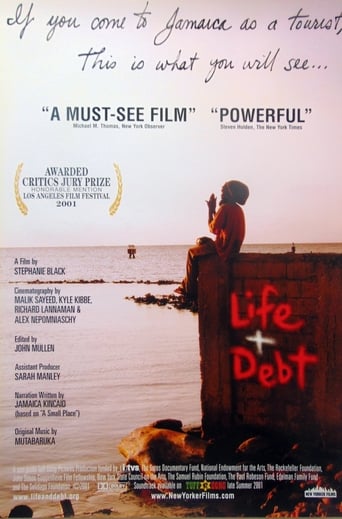Life and Debt (2001)

Life and Debt is a 2001 American documentary film that examines the economic and social situation in Jamaica, and specifically how the International Monetary Fund and the World Bank's structural adjustment policies have impacted the island.
Watch Trailer
Cast


Similar titles
Reviews
good film but with many flaws
A film with more than the usual spoiler issues. Talking about it in any detail feels akin to handing you a gift-wrapped present and saying, "I hope you like it -- It's a thriller about a diabolical secret experiment."
The movie turns out to be a little better than the average. Starting from a romantic formula often seen in the cinema, it ends in the most predictable (and somewhat bland) way.
A clunky actioner with a handful of cool moments.
As a documentary 'Life and Debt' has many merits one of the most apparent and significant of which is the highly imaginative and effective way that it draws a complex concept into the form of an 80 minute film. A film with so much to say necessarily risks either becoming boring or inaccessible, however Life and Debt suffers from neither of these. Ideas are treated elegantly and efficiently, and invariably illustrated with footage of entirely appropriate and often poignant examples, which in turn allows for excellent pacing. These assets allow what could have been a very dry and abstract film to instead comfortably hold the audience's interest. By way of criticism I would say that on certain occasions subtitles were probably required to render the material fully accessible to an international audience, as the accents/dialect (and cultural constructions of language) are such that the meaning of speakers is periodically unclear. But this and what other minor failings exist pale in comparison to its strengths.
To suggest that Jamaicans are stupid enough to hate the one huge source of Revenue left open to them for economic survival - the American - tourist - suggests Jamaicans are only capable of Knee-jerk analysis. Crucially, people go on holiday to largely experience a different cultural environment. When you return from holiday, how boring it would be to tell someone about what you experienced, if it is no different from a holiday you could have had in another part of the U.S.A/Canada/Europe etc.. Decimating cultures and economies outside of the U.S.A. and still expect to have a lovely, exhilarating and refreshing holiday seems to be contradictory. If the bullying persists unchecked, eventually there is no other life experience except a U.S.A one. At what point in this farce do the major commercial and political forces in the USA/Europe etc. take responsibility for their actions, think they have gone too far, and seek to help repair some of the damage caused by their actions. This does not even take into account the money "they" made from the "african slave trade". Why is it acceptable for the "Jews" to discuss the recent past "holocast" and "bondage" in Egypt (centries ago), but "Africans in The West" must not mention how they have been ripped off for 500+ years, and "what about reparations" - just like the Jewish people after "World War Two". The fact is this film shows what actually happened to Jamaica, and who were the "Players" in attacking an essentially defenceless people. With a Socialist Government in Jamaica being hammered by the enormous hike in oil prices and the huge cost of training doctors, engineers etc. to keep the country going in the 1970's - while these same essential key workers were continually enticed to North America, the Jamaican Government tried to be neighbourly with its neighbour Cuba - mutual interest (only 80 miles away). The bilateral assistance, as I understand it was for Jamaica to help Cuba develop its Tourist industry, and Cuba help out with essential skilled people (doctors, engineers etc.). No rational Jamaican could ever contemplate THE PEOPLE ever accepting a Totalitarian state in Jamaica, if they ever understood the lasting legacy of the "Slave Trade in Jamaica". USA power brokers did not see it this way and chose to decimate the Jamaican economy. Can the definition of freedom really be restricted to acting as a mimic of a citizen of U.S.A.?As pragmatic people Jamaicans continue to find ways to progress. Unfortunately with the introduction of foreign "organised crime/state secret services" (1970's)to ensure the toppling of the Jamaican Socialist government, Jamaican criminals were trained in "cocain" trafficking, mechanics of illegal gun purchase and use etc., hence the current so-called "Yardies". The more socialist of the two main political parties has been entrusted with governing Jamaica for more than the last two terms showing who the people trust more to guide their country, despite the hardships. The fraud exposed in this film is that USA can still choose to be an honourable "Big Brother" to Jamiaca, Cuba, Barbados, Guyana, Trinidad, Brazil, Chile, Venezuala, etc., etc.; without appearing to act as a loutish bully with no honest stance towards democracy. What is the point preaching NO GOVERNMENT SUBSIDIES as acceptable, while hugely subsidising USA Agri-business (especially milk - see film comments). The world is asking USA to grow up and stop making itself look like it is a pirate nation that is so morally bankrupt it does not believe it matters that smaller countries see it as a bunch of LIARS. This film tries to encourage USA to see that there is an alternative - an honest, honourable one. This film shows that we the Jamaicans still offer the hand of friendship to our American neighbours, and as demonstrated by Colin Powel (Jamaican upbringing and ethics) have a basic decency which can, when allowed to grow naturally MAKE THIS WORLD A BETTER PLACE FOR ALL OF US. USA promoting organised crime has once again caused problems for all of us. A previous contributer made one sensible comment - why should a USA agri-business need to smash the remaining 5% of business in other countries producing economic refugees and the expansion of organised crime cartels smuggling people to hidden economies in "Developed Economies" - Europe and North America? Why promote getting rid of stable governments to produce more refugees? More piracy ? To cream off the highly trained professionals, business brains,etc. to the USA economy? The small countries then have to borrow more money (from USA, "World Bank" etc.) to train more professionals just to keep the country going. The USA institutions that these people go to work for would happily pay (minimal) compensation if the USA Government insisted on them honouring their moral obligations. The film asks the question - "Is there a sensible point to perpetuating such a USA Foreign policy?" Jamaicans wish sense to prevail -THE POINT OF THE FILM. It is still a mystery to most Jamaicans why some USA business leaders appear to be more interested in excess CONTROL of other peoples economies, culture, views etc. rather than mutual benefit - exchange of ideas - bilateral trade - mutual growth. Do they really believe the summit of human existence is the "American Dream". But if you do not live in America (USA) would you not have the "Jamaican Dream", the "French Dream", the "South African Dream", the Russian Dream", the Chinese Dream", the "Irish Dream", the "Chilean Dream", the "Cuban Dream", the "Iranian Dream", the "United Nations Dream" etc. etc. On what basis does the "American Dream" have to be foisted on the weaker nations, where only a one-sided dialogue is acceptable? Don't these "power brokers" get bored talking to themselves?
LIFE AND DEBT / (2001) *1/2 (out of four)Documentaries are probably the easiest kind of movie to make-no demanding actors, expensive special effects, enormous filming crews, or massive budgets. However, covering such specific topics, documentary movies are probably also the hardest kind of film to make entertaining. Michael Moore does it best when he injects a cunning wit into his documentaries like "The Big One" and "Roger & Me." 1999's "Barenaked in America," detailing a Canadian band, also entertained audiences while still supplying interesting information on the subject. "Life and Debt" does not do this. It contains an appropriate style, but lacks interest. For most of us, when we think about Jamaica, we think of a popular vacation spot. Who wouldn't enjoy it's beautiful locations, warm weather, and welcoming atmosphere. American's can even enter with a delusion of wealth since thirty Jamaican dollars equal approximately one US dollar. But "Life and Debt" does not exploit the location as an exotic locale, it examines how the International Monetary Fund, the World Bank, and other aid organizations have changed the Jamaican economy over the past several decades. The movie examines how agriculture, industry, government, and culture have been restructured by import-export systems, forcing the locals to live in poverty and work in sweatshops. Director Stephanie Black does not take the normal approach to such material. She injects a sarcastic style into the scenes. An effective reggae soundtrack-including songs by Bob Marley, Ziggy Marley, Mutubaruka, and Peter Tosh-seasons the film. Unfortunately, despite the filmmakers' attempts, the spices do not rid the stuffy scenes of a stale aftertaste. Author Jamaica Kincaid, whose book "A Small Place" inspired the film, guilds the audience on a tourist's journey through the visually stunning country. On a technical level, this is a good documentary; it makes good points about the topic. It surprises us while proving wrong our assumptions about Jamaican.If you are interested in this kind of thing, this is definitely the movie to watch. But if you're not particularly interested in this topic, it's difficult to care about currency, economics, banana production, the country's poverty, etc. I found myself daydreaming, looking at my watch, dozing off. For me, this was a tedious, tremendously boring experience. Though we can't accuse this movie of miscommunication. After watching the movie, we will all see Jamaica in a new light that is, if we are still awake.
This is a really tragic and shattering film. I saw it a few days ago in New York at a lower East side cinema. It is a very honest and yet artistically distinguished portrait of the demise of a Caribbean nation - Jamaica. Interspersed with the cold, hard facts of how the international community has loaned the country money at predatory interest rates, and then dumped products on Jamaica's undeveloped markets, thus destroying native industries, are scenes of tourists enjoying Jamaica's bounties, oblivious to the nature of the natives' distress.The woman who made this film narrates it herself, and she wrote a book on the subject before she made this film. So her credentials for knowledge about the subject are very strong. She employs a few cinematic flourishes, such as the blurred-edge-of-screen effect when she shows poor Jamaicans digging about in a garbage dump. The soundtrack is replete with great reggae songs, including the potent and topical title track.Basically, this film is more important in its 90 minutes than about a hundred typically vapid Hollywood productions stacked back to back. This film teaches you something about the world - about the exploitation of the weak, about the myth of the "helping" nature of the IMF and the World Bank, and about the everyday lives of desperately poor third world people. All proponents of "globalization" should see this film, and then be required to defend their views to the people who have been victimized by globalization's cruel and relentless march. Similarly, everyone who works for the major media in the US should see this, and should be ashamed of themselves for defending the policies that have contributed to the downfall of a proud and beautiful people such as those of Jamaica. And silence is the major defense employed on behalf of such policies.







